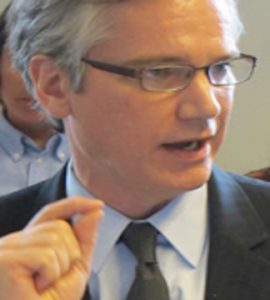

Andrew Light: What Happened in Paris? How Differentiation Evolved to Create a Global Climate Agreement.
16 September 2016, 1:00 pm - 2:30 pm EDT
ABSTRACT
Last December, after twenty years of apparent incremental progress, over 190 countries meeting under the auspices of the United Nations Framework Convention on Climate Change managed to create what promises to be a lasting international climate agreement. Debates continue however over whether the greenhouse gas mitigation commitments that parties brought to the table in Paris are sufficiently robust to achieve the agreement’s lofty aspirations. These debates may however miss one of the agreement’s most important outcomes: potentially settling the core problem of distributive justice that made this process so difficult: which parties need to cut their emissions, how much, and on what time frame. To better understand the significance of the new Paris Agreement we will review the history of the UN climate negotiations, with a focus on how debates over differentiation evolved over time to create a platform for what is expected to be increased commitments to climate action moving forward.
SPEAKER PROFILE
 Andrew Light has two interrelated careers. One is as an academic where he has worked for almost twenty years on the normative implications of environmental policy. The other is as a policy expert and advocate where he works on the front lines of international climate and science policy. From 2013-2016 he served as Senior Adviser and India Counselor to the U.S. Special Envoy on Climate Change, and as a Staff Climate Adviser in the Secretary of State’s Office of Policy Planning in the U.S. Department of State. In this capacity he was Co-Chair of the U.S.-India Joint Working Group on Combating Climate Change, Chair of the Interagency Climate Working Group on the Sustainable Development Goals, and served on the senior strategy team for the UN climate negotiations. Before joining the U.S. government he was also a Senior Fellow at the Center for American Progress, where he was chief adviser on international climate policy to the center’s founder and chairman, John Podesta. At this time he authored or co-authored eleven major reports on climate change and renewable energy, and over a hundred columns and editorials. He will continue much of this work in his new role as Distinguished Senior Fellow in the climate program at the World Resources Institute.
Andrew Light has two interrelated careers. One is as an academic where he has worked for almost twenty years on the normative implications of environmental policy. The other is as a policy expert and advocate where he works on the front lines of international climate and science policy. From 2013-2016 he served as Senior Adviser and India Counselor to the U.S. Special Envoy on Climate Change, and as a Staff Climate Adviser in the Secretary of State’s Office of Policy Planning in the U.S. Department of State. In this capacity he was Co-Chair of the U.S.-India Joint Working Group on Combating Climate Change, Chair of the Interagency Climate Working Group on the Sustainable Development Goals, and served on the senior strategy team for the UN climate negotiations. Before joining the U.S. government he was also a Senior Fellow at the Center for American Progress, where he was chief adviser on international climate policy to the center’s founder and chairman, John Podesta. At this time he authored or co-authored eleven major reports on climate change and renewable energy, and over a hundred columns and editorials. He will continue much of this work in his new role as Distinguished Senior Fellow in the climate program at the World Resources Institute.
In his academic work Light is the author of over 100 articles and book chapters on climate change, restoration ecology, and urban sustainability, and has authored, co-authored, and edited 19 books, including Environmental Values (Routledge, 2008), Controlling Technology (Prometheus, 2005), Moral and Political Reasoning in Environmental Practice (MIT, 2003), Technology and the Good Life? (Chicago, 2000), Environmental Pragmatism (Routledge, 1996), and the forthcoming Ethics in the Anthropocene (MIT). He has previously taught at a variety of institutions, including the Environmental Conservation Program at NYU and the School of Public Affairs and Department of Philosophy at the University of Washington, Seattle. More detail about his work can be found at the Institute for Philosophy and Public Policy website.
Read more about Andrew Light.
EVENT POSTER
View and download a copy of the event poster.
